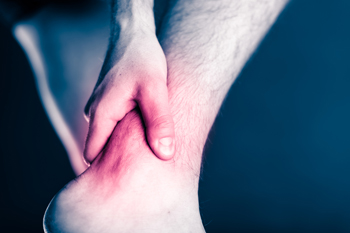
Diagnosing an Achilles tendon injury, such as a tear or rupture, involves several precise steps to ensure accurate identification and treatment. First, a podiatrist will discuss your symptoms, focusing on any sharp pain in the ankle or back of the leg, difficulty walking, or an audible snap at the time of injury. A thorough physical examination follows, often starting with the Thompson test, where the podiatrist will squeeze your calf muscle while you lie face down. A lack of foot movement suggests a tear. Plantar flexion tests assess your ability to flex the foot and stand on your toes. Visible signs, like a soft spot or bruising near the tendon, also may indicate damage to the Achilles tendon. Weight-bearing tests evaluate your capacity to stand on the injured foot and detect limping. For a more detailed view, imaging tests such as ultrasound or MRI may be performed. An ultrasound provides 2D images to pinpoint partial tears, while an MRI offers 3D images, which are particularly useful for identifying complete ruptures where tendon ends are detached. If you suspect an Achilles tendon injury, it's suggested that you make an immediate appointment with a podiatrist for a diagnosis and treatment.
Achilles tendon injuries need immediate attention to avoid future complications. If you have any concerns, contact Glenn Aufseeser, DPM of Lakewood Foot and Ankle Specialists. Our doctor can provide the care you need to keep you pain-free and on your feet.
What Is the Achilles Tendon?
The Achilles tendon is a tendon that connects the lower leg muscles and calf to the heel of the foot. It is the strongest tendon in the human body and is essential for making movement possible. Because this tendon is such an integral part of the body, any injuries to it can create immense difficulties and should immediately be presented to a doctor.
What Are the Symptoms of an Achilles Tendon Injury?
There are various types of injuries that can affect the Achilles tendon. The two most common injuries are Achilles tendinitis and ruptures of the tendon.
Achilles Tendinitis Symptoms
- Inflammation
- Dull to severe pain
- Increased blood flow to the tendon
- Thickening of the tendon
Rupture Symptoms
- Extreme pain and swelling in the foot
- Total immobility
Treatment and Prevention
Achilles tendon injuries are diagnosed by a thorough physical evaluation, which can include an MRI. Treatment involves rest, physical therapy, and in some cases, surgery. However, various preventative measures can be taken to avoid these injuries, such as:
- Thorough stretching of the tendon before and after exercise
- Strengthening exercises like calf raises, squats, leg curls, leg extensions, leg raises, lunges, and leg presses
If you have any questions please feel free to contact our offices located in Lakewood and Manchester Township, NJ . We offer the newest diagnostic tools and technology to treat your foot and ankle needs.
